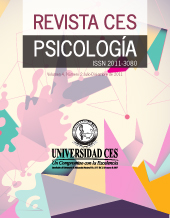The social representation as a theoretical category and methodological strategy
DOI:
https://doi.org/10.21615/cesp.10.1.7Keywords:
Social Representation, Social Theory, Qualitative Research, MethodologyAbstract
The article carries out Social Representation thematic, a theoretical and methodological review of these category, on the understanding that its heuristic potential and its ability us a methodological tool, makes possible the depth study of the senses and significants that everyone gives itself in everyday life, as a central objective of the qualitative research methodology. The relevance and validity of this category leads to the articulation of the different original theoretical traditions, to approach the techniques related to the construction of the data and to develop the modes that adopt, respectively, interpretation and analysis, towards the production of contextualized knowledge.
Downloads
References
Abric, J. (2001). Prácticas sociales y representaciones. Recuperado de http://datateca.unad.edu.co/contenidos/403019/Entorno_de_Conocimiento/Lecturas_Complementarias/Abric_JC_Practicas_Sociales_y_Representaciones.pdf
Acosta, M, Quiñones, M., & Supervielle, M. (2015). Introducción a la Sociología Cualitativa. Montevideo: Comisión Sectorial de Educación Permanente. Universidad de la República.
Araújo, A. (2013). Todos los tiempos, el tiempo. Trabajo, vida cotidiana e Hipermodernidad. Montevideo: Psicolibros.
Aristóteles. (1994). Tratados de lógica. Obra completa. Volumen I Organon. Madrid: Gredos.
Aubert, N. (2004). L’individu hypermoderne. Ramonville Saint-Agne: Èrès.
Bauman, Z. (2005). Identidad. Buenos Aires: Losada.
Bauman, Z. (2000). Modernidad líquida. Buenos Aires: Fondo de Cultura Económica.
Berger, P., & Luckmann, T. (1986). La construcción social de la realidad. Buenos Aires: Amorrortu.
Blumer, H. (1982). El Interaccionismo simbólico, perspectiva y método. Barcelona: Hora D.L.
Canales, M. (coord.). (2014). La escucha de la escucha. Análisis e interpretación de la investigación cualitativa. Chile: LOM Ediciones
Canales, M. (coord.). (2006). Metodologías de Investigación Social. Introducción a los oficios. Chile: LOM Ediciones.
Castoriadis, C. (1980). La institución imaginaria de la sociedad. (Vol. 1 y 2): El imaginario social y la institución. Barcelona: Tusquets.
Coffey, A., & Atkinson, P. (2003). Encontrar sentido a los datos cualitativos. Estrategias complementarias de investigación. Colombia: Contus.
Corbin, J., & Staruss, A. (1990). Basics of Qualitative Research: Grinded Theory, procedures and techniques. Canadá: Sage Publication,
Durkheim, E. (1987). La división del trabajo social. Buenos Aires: Ediciones LEA,
Flament, C. (1989). Structure et dynamique des représentations sociales. En D. Jodelet (Ed.). Les représentations sociales. (pp. 204-219). Paris: Presses Universitaires de France,
Flores, R., & Naranjo, C. (2014). Análisis de datos cualitativos: el caso de la grounded theory (teoría fundamentada) pp. 75-113. En M., Canales (coord.), La escucha de la escucha. Análisis e interpretación de la investigación cualitativa. Chile: LOM Ediciones.
Glaser, B., &. Strauss, A. (1967). The discovery of grounded theory: strategies for qualitative research. New York: Aldine Publishing Compan.
Huberman A., & Miles, M. (1991). Qualitative, Data Analysis. Canadá: Sage Publication,
Ibáñez, J. (1991). El regreso del sujeto: la investigación social de segundo orden. Madrid: Siglo XXI Editores,
Jodelet, D. (1986). La representación social: teoría, método y técnica. En S. Moscovici (comp.), Psicología Social II (pp. 116-125). Buenos Aires: Paidos,
Kant, I. (2007). Crítica de la razón pura. Buenos Aires: Colihue,
Lipovetsky, G. (2006). Los tiempos hipermodernos. Barcelona: Anagrama,
Martinic, S. (2006). El estudio de las representaciones sociales y el análisis estructural del discurso. En M., Canales (coord.), Metodologías de Investigación Social. Introducción a los oficios. Chile: LOM Ediciones,
Moscovici, S. (comp). (1986). Psicología social. Buenos Aires: Paidós,
Navarro Carrascal, O., & Restrepo Ochoa, D. (2013) Representaciones Sociales: perspectivas teóricas y metodológicas. CES Psicología, 6(1), i-iv. Recuperado de http://148.215.2.10/articulo.oa?id=423539419001
Pierce, C. (2007). El pragmatismo. Madrid: Ediciones Encuentro.
Weber, M. (1985). Economía y Sociedad. Conceptos sociológicos fundamentales. Montevideo: Fondo de Cultura Universitaria.
Weisz, C. (2014). Imaginario, representación social y construcción identitaria en la Cooperativas Sociales. En XV Jornadas Psicología de las Organizaciones y el Trabajo. Montevideo: Facultad de Psicología, Universidad de la República.
Downloads
Published
How to Cite
Issue
Section
License
Copyright (c) 2016 Clara Betty Weisz

This work is licensed under a Creative Commons Attribution-NonCommercial-ShareAlike 4.0 International License.
Each manuscript is accompanied by a statement specifyingThat the materials are unpublished, that have not been previously published in printed formatElectronic and that they will not be presented to any other means before knowing the decision of the magazine. ThroughoutIn case, any previous publication, sea in printed or electronic form, must be made known to the editorial staffWriting The authors attach a signed statement stating that, and the manuscript is acceptedFor publication, the rights of reproduction are the exclusive property of the Journal CES Psychology.| Article metrics | |
|---|---|
| Abstract views | |
| Galley vies | |
| PDF Views | |
| HTML views | |
| Other views | |




